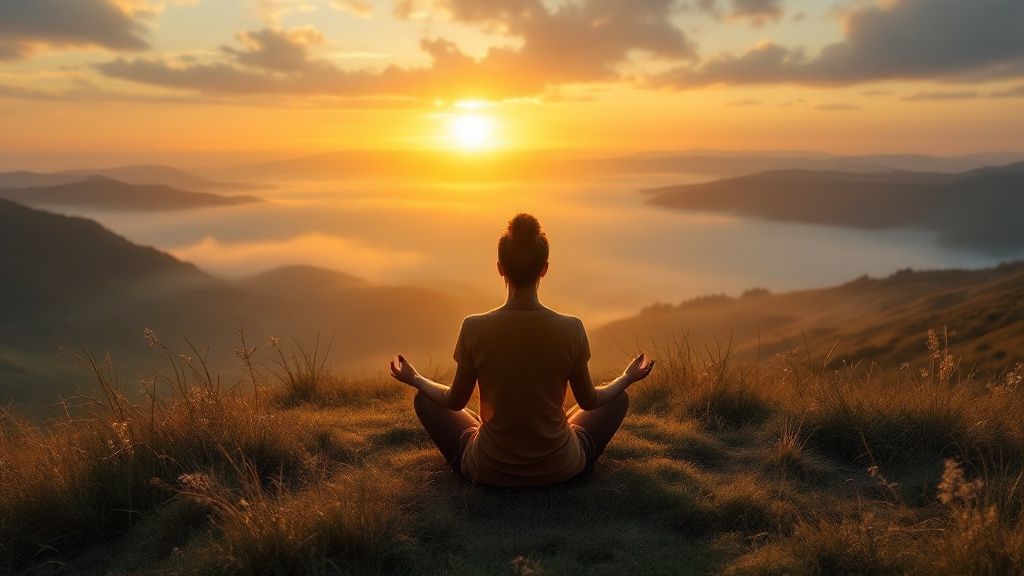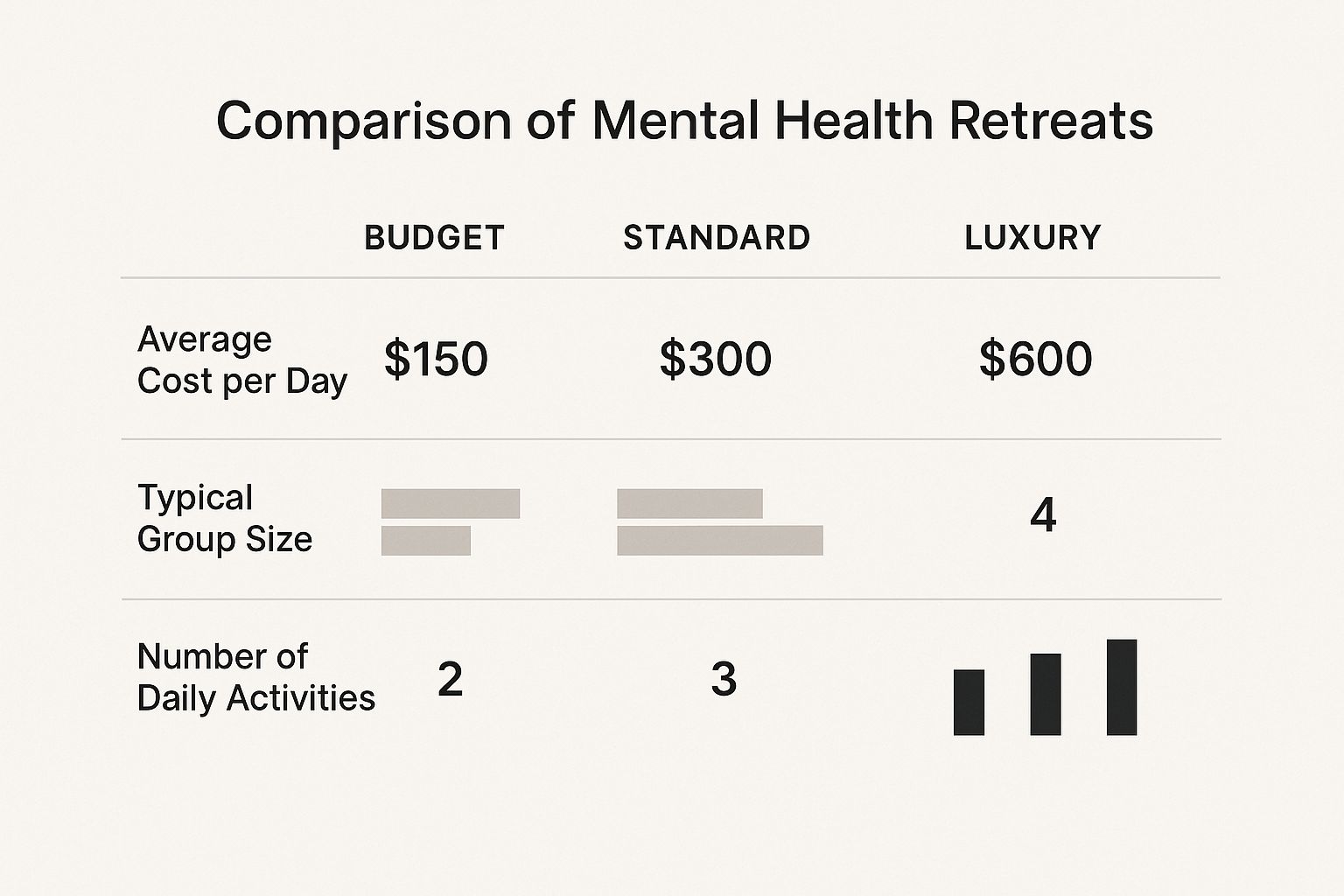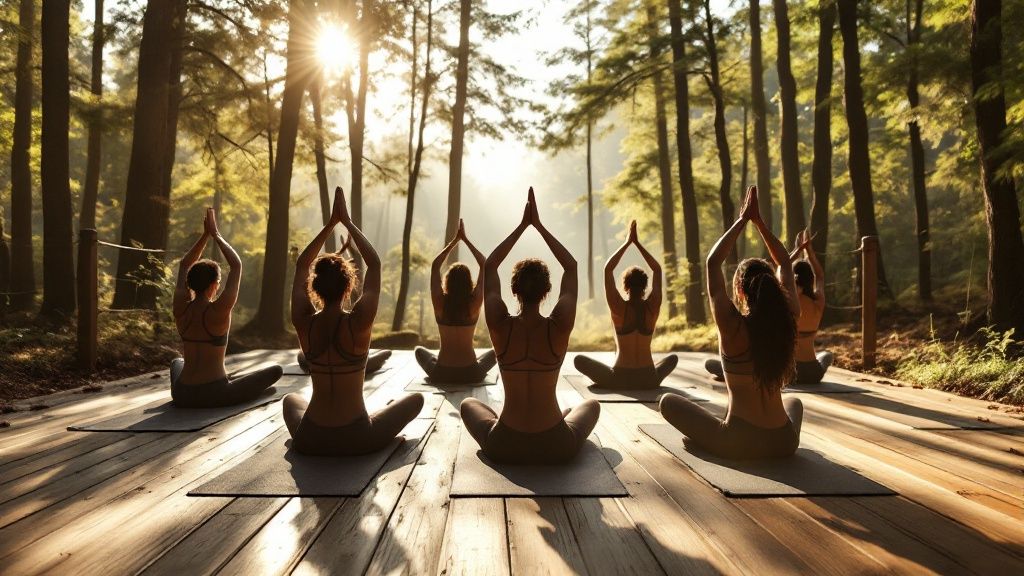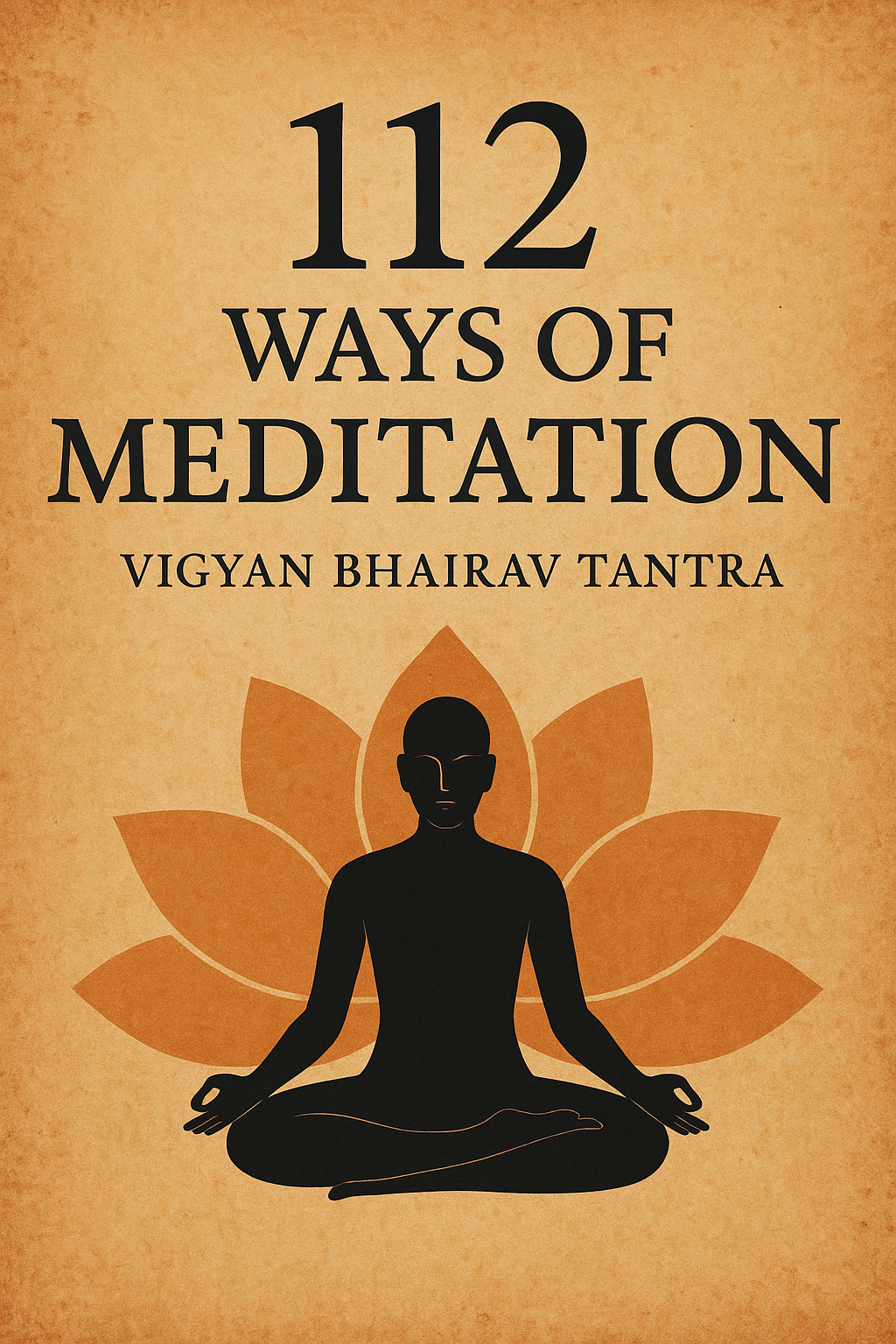Ever feel like you just need to hit the pause button on life? That’s the core idea behind a mental health retreat. It’s a dedicated, immersive experience designed for intentional healing and self-discovery, and it’s a world away from your typical vacation.
Think of it as a purposeful timeout, a structured and supportive space where you can finally disconnect from the daily grind, reconnect with yourself, and learn wellness practices that will actually stick.
What Is a Mental Health Retreat Really Like?
It’s easy to picture a mental health retreat as just a fancy spa weekend or a quiet holiday. And while relaxation is definitely part of the package, the real purpose goes much deeper. It’s less about escaping your life and more about learning the skills to handle it better when you get back.
Imagine your mind is a car that’s been running nonstop for years. It still gets you where you need to go, but the engine is making weird noises, the alignment is off, and that pesky check-engine light has been on for ages. A mental health retreat is like taking that car to a specialist for a complete tune-up. It's dedicated time to figure out what's going on under the hood, make the right adjustments, and get you running smoothly for the road ahead.
More Than Just a Vacation
On a standard holiday, the goal is usually sightseeing or pure relaxation. A mental health retreat, on the other hand, is built around a schedule of activities all designed for inner work, not just external fun.
This structured approach is designed to create real, lasting personal growth in a short amount of time. You’ll likely find yourself engaged in activities like:
- Guided Meditations and Mindfulness Sessions: Learning to quiet that non-stop inner chatter and be more present.
- Therapeutic Workshops: Group sessions focused on practical topics like stress management, emotional resilience, or better communication.
- Somatic Practices: Activities like yoga, dance, or breathwork that help release tension and trauma stored in the body.
- Time in Nature: Using the incredible calming and grounding power of the natural world to heal.
The Power of a Supportive Environment
One of the most incredible things about a retreat is the feeling of community. You're surrounded by facilitators who are trained to create a safe space and other people who are on a similar journey. This takes away the pressure to pretend you’re “fine” and allows for real vulnerability and connection.
You can explore a huge variety of retreats on RetreatDesk to get a feel for the different environments out there.
The desire for these kinds of intentional getaways is booming. The global wellness tourism market is growing like crazy, fueled by people seeking digital detoxes and travel focused on mental well-being. Projections estimate the market could hit nearly $978.14 billion by 2025, which just shows how much we’re all starting to prioritize our mental and emotional health. This growth proves that more and more of us are realizing we need that intentional "tune-up."
The Real Benefits of Taking a Step Back

A mental health retreat is so much more than just a fancy vacation. Sure, getting a break from your routine is part of it, but the real magic is in actively changing your relationship with stress, your own mind, and how you react to life's curveballs. Think of it as an investment in building a stronger, more peaceful inner world.
I like to use the analogy of a garden. Imagine your mind is a garden you've been way too busy to look after. The weeds of negative thoughts have started to creep in, the soil is dry, and the whole thing feels messy and out of control. A retreat gives you the time, the tools, and the expert guidance to get in there, pull those weeds, and nourish the soil. You don't just leave with a tidy garden; you leave knowing exactly how to keep it that way.
The shifts you'll experience are real and tangible, creating positive ripples that touch every part of your life long after you've unpacked your bags.
Building a Toolkit for Emotional Resilience
One of the best things about a retreat is that you walk away with practical, real-world tools you can actually use. This isn't about sitting through dry lectures on abstract theories. It's about learning and practicing new skills in a place where you feel supported and safe.
You won't just hear about mindfulness; you’ll do it, for hours at a time, until it starts to feel second nature. You won't just read about regulating your emotions; you’ll feel what it's like in a guided workshop. These experiences stick with you, creating a mental toolkit you can pull from anytime things get tough.
Some of the key skills you might pick up include:
- Breaking Negative Thought Cycles: Many retreats use cognitive-behavioral techniques to help you spot, question, and rewrite those pesky automatic negative thoughts that feed anxiety.
- Improving Your Mind-Body Connection: Through things like yoga, breathwork, or somatic therapy, you'll learn to tune into what your body is telling you, release tension you didn't even know you were holding, and process stuck emotions.
- Developing Healthy Communication: Group sessions can be amazing for learning how to voice your needs, set boundaries, and listen with real empathy—skills that will transform your relationships back home.
The point isn't to get rid of stress—that's impossible. It's to fundamentally change how you respond to it. You learn to navigate life's storms with a steady hand instead of getting knocked over by every wave.
Gaining Clarity and a New Perspective
Physically stepping away from your day-to-day life is like climbing a mountain to get a better view of the valley below. That distance creates incredible clarity. Without the constant buzz of work emails, family demands, and social media notifications, you can finally hear yourself think.
This space allows you to see your challenges from a totally new angle. A problem that felt like a brick wall at home might suddenly reveal a clear path forward from the calm of a mental health retreat. You get a fresh perspective on what really matters, which can make those big life decisions feel a whole lot easier. It's not uncommon for people to find a retreat was the push they needed to finally change careers, heal a relationship, or just start putting their own well-being first.
Deep Physical and Mental Restoration
Let’s be honest, chronic stress beats you up. It messes with your sleep, weakens your immune system, and leads straight to burnout. A retreat is the perfect antidote because it’s an environment built specifically for deep rest and repair.
With a gentle schedule, nourishing food, and a focus on calming your entire nervous system, your body finally gets the chance to heal. In fact, studies have shown that practices like meditation can lead to better sleep, lower blood pressure, and reduced levels of cortisol, the main stress hormone.
The result is a feeling of rejuvenation that goes bone-deep. You don't just feel "less stressed"—you feel fundamentally rested on a cellular level. This deep restoration gives you the energy you need to keep up your new healthy habits when you get back to the real world.
Exploring Different Kinds of Mental Health Retreats
Once you decide you’re ready for a retreat, you’ll find that the world of mental health getaways is surprisingly vast. The term itself is a huge umbrella covering all sorts of experiences, each tailored to different needs, personalities, and goals. It’s definitely not a one-size-fits-all situation; think of it more like a menu where you get to pick the experience that truly speaks to you.
This variety is actually a good thing! It means there's a perfect fit out there for you, whether you're craving quiet solitude to hear your own thoughts again or need an active, therapeutic adventure to shake things up. Knowing the difference is the first step toward finding a retreat that will genuinely help you heal and grow.
Mindfulness and Meditation Retreats
When most of us hear “mental health retreat,” our minds often jump to mindfulness or meditation, and for good reason. These retreats are all about the practice of being present and finding that quiet space within yourself. The main goal is to turn down the volume on that non-stop mental chatter and get back in touch with your inner self.
The activities are usually gentle and introspective. You can expect things like:
- Guided Meditation: Sessions led by experienced teachers who help you focus your mind and let go of distractions.
- Mindful Movement: Think slow, intentional yoga or walking meditation, designed to reconnect your mind with your body.
- Silent Periods: Many of these retreats include designated periods of silence, which can be incredibly powerful for deep reflection.
These are absolutely perfect if you're feeling overwhelmed by the constant noise of daily life, dealing with anxiety, or just want to build a more peaceful, solid inner foundation.
Adventure and Activity-Based Retreats
On the flip side, for those who find clarity and healing through movement and nature, an adventure-based retreat is a fantastic alternative. These programs mix therapeutic work with physical activities, using the great outdoors as a powerful setting for personal growth. The focus here is on building confidence, facing challenges, and connecting with others through shared experiences.
Instead of quiet contemplation, your days might be packed with hiking, surfing, rock climbing, or kayaking. These physical hurdles often serve as powerful metaphors for overcoming personal obstacles, all while guided by trained facilitators who help you process what you’re feeling. This style is great for anyone feeling stuck and needing a jolt of inspiration, or for people who simply heal better by doing rather than sitting still.

This image helps illustrate how the investment level often ties into the experience—luxury options tend to offer more personalized attention in smaller groups, while budget-friendly retreats might have a more communal vibe.
Specialized and Themed Retreats
Beyond these two broad categories, there's a whole world of specialized retreats designed around specific life challenges or wellness goals. These programs offer a highly focused environment where you can work on a particular issue alongside others who really get what you’re going through.
Having that kind of targeted support can be incredibly effective. It's no surprise that the wellness retreats market, valued at USD 222.5 billion in 2025, is expected to balloon to USD 363.9 billion by 2032. This huge growth shows a global shift toward being more proactive about our mental and emotional health.
Here are a few popular specialized options:
- Trauma-Informed Retreats: Led by licensed therapists, these offer a safe, clinical space for healing from past trauma using proven methods.
- Grief and Loss Workshops: A compassionate setting to process bereavement with the guidance of counselors and the support of peers.
- Digital Detox Retreats: Designed to help you unplug from your screens and reconnect with yourself and the world around you. No phones allowed!
- Luxury Wellness Escapes: These blend deep inner work with top-tier amenities like spa treatments and gourmet food. You can browse some amazing wellness retreats to get a feel for what’s out there.
To help you sort through the options, here's a quick breakdown of the different styles.
Comparing Different Mental Health Retreat Styles
A quick comparison of common retreat types to help you decide which style aligns best with your personal goals and preferences.
| Retreat Type | Primary Focus | Common Activities | Best For |
|---|---|---|---|
| Mindfulness & Meditation | Inner peace, presence, and stress reduction | Guided meditation, silent periods, mindful movement (yoga, walking) | Individuals feeling overwhelmed, anxious, or seeking a deeper self-connection. |
| Adventure & Activity | Building confidence and resilience through physical challenge | Hiking, surfing, rock climbing, kayaking, group challenges | Those feeling stuck or who process emotions best through action and nature. |
| Trauma-Informed | Healing past trauma in a safe, clinical environment | Evidence-based therapies (EMDR, somatic experiencing), group processing | Survivors of trauma who need specialized, professional therapeutic support. |
| Digital Detox | Disconnecting from technology to reconnect with oneself | Nature walks, journaling, creative workshops, group connection | Anyone feeling burnt out by screens and constant digital stimulation. |
| Luxury Wellness | Holistic rejuvenation for mind, body, and spirit | Spa treatments, gourmet meals, yoga, workshops, high-end amenities | People seeking deep restoration combined with comfort and pampering. |
Ultimately, the goal is to find the retreat that feels right for you.
Choosing the right type of retreat is about honestly assessing what you need most right now. Is it silence and solitude? Physical challenge? Or a supportive community focused on a shared experience? Answering that question is the key to finding a truly life-changing getaway.
How to Choose the Right Retreat for You

Choosing a mental health retreat is a big deal. It’s a deeply personal decision, and let's be honest, the sheer number of options out there can feel a little overwhelming. But try to see this process as the very first step in your healing journey—not just another task on your to-do list. Simply taking the time to consider what you truly need is an act of self-care.
To make the right choice, you have to look inward first. What works wonders for one person might be a total miss for another. This is your chance to be really honest with yourself about what you want to achieve, what your comfort levels are, and the kind of environment that will actually help you grow.
Start with Your Personal Goals
Before you even think about opening a single website, take a moment to pause. Grab a journal, or just find a quiet spot to think, and ask yourself some real questions. Getting crystal clear on your "why" is the most important part of finding the right "where" and "how."
What are you truly hoping to get out of this? Your answer is your compass. It will point you toward the right kind of experience.
- Are you totally fried from burnout and just need to recover? A retreat focused on deep rest, gentle yoga, and time in nature might be exactly what the doctor ordered.
- Are you working through a specific life event, like a tough breakup or the loss of a loved one? In that case, a specialized retreat with professional therapeutic support can provide the safe space you need to process everything.
- Do you want to build up your mental toolkit and learn new coping skills? Look for programs that offer practical workshops on things like mindfulness, emotional regulation, or cognitive behavioral techniques.
- Are you just feeling stuck and desperately need a fresh perspective? Sometimes, an adventure-based retreat can be the perfect way to build confidence and shake loose from old patterns.
This little self-assessment is everything. It makes sure you're not just booking a nice vacation, but investing in an experience that’s truly designed to meet your specific emotional and mental needs.
Vet the Program and Facilitators
Okay, once you have a better sense of your goals, it's time to start the research. The quality of any retreat really comes down to the people running it. This is not the time to be shy—dig into the credentials and experience of the facilitators.
You'll want to look for retreats led by qualified and licensed professionals, especially if you’re dealing with deeper issues like trauma or anxiety. A weekend yoga teacher can be fantastic, but they simply aren't trained to guide you through complex psychological work.
A great retreat is built on a foundation of trust and safety. The expertise of the staff is non-negotiable, as it directly impacts your ability to be vulnerable and do the work you came to do.
Check the retreat’s website for detailed bios of the staff. Keep an eye out for credentials like licensed therapists (LCSW, MFT), psychologists (PhD, PsyD), or certified coaches who have extensive training in what they do. This is how you know you’ll be in capable and ethical hands.
Key Questions to Ask Before Booking
Making a smart decision means asking the right questions. Any reputable retreat will be more than happy to give you clear, transparent answers. Think of it like a mini-interview—you're making sure they are a good fit for you.
Here’s a practical checklist to use when you're on the phone or emailing with retreat organizers:
- What are the specific qualifications of the people leading the sessions? Ask about their licenses, certifications, and how long they've been doing this work.
- What kind of therapeutic methods do you use? Are they based in mindfulness, CBT, somatic therapy, or something else? Make sure their approach feels right for you.
- What does a typical day look like? Get a feel for the balance between group work, solo time, and rest.
- What’s the usual group size? Smaller groups often mean more personal attention, while larger ones can offer a wider range of perspectives.
- How do you handle emotional or psychological crises if they come up? A professional program will always have a clear safety plan in place. This is a must-ask.
Getting solid answers to these questions will give you the confidence to choose a mental health retreat that truly aligns with your needs for safety, support, and personal growth. If you're considering a specific timeframe, you can find many great options for a week-long mental health retreat that offer a perfect blend of deep immersion and practicality.
What to Expect During and After Your Stay
So, you're thinking about a mental health retreat. It’s completely normal to feel a mix of excitement and maybe a little bit of apprehension. Knowing what’s coming—both during the retreat itself and in those crucial first few days back home—can make all the difference. It helps you relax into the experience and get the most out of it.
Think of this not as a quick fix, but as the start of a whole new way of relating to yourself.

The retreat is a space intentionally designed for you to unplug from the noise of daily life and tune back into yourself. But more than that, it's about giving you real, practical tools you can actually use when you get back to the real world.
A Glimpse into a Typical Day
While every retreat has its own unique flavor, most are built around a predictable daily rhythm. This structure is surprisingly comforting; it creates a sense of safety and frees up your mental energy so you can focus on the important stuff instead of worrying about what's next.
Here’s a rough idea of what a day might look like:
- Morning (7 AM - 12 PM): Your day will likely start early and gently. Picture a quiet wake-up, followed by guided meditation, some mindful movement like yoga, or maybe a silent walk to soak in the nature around you. After a healthy breakfast, you’ll probably dive into a group session focused on a core theme, like building emotional resilience or learning to manage stress.
- Afternoon (12 PM - 5 PM): The afternoons are usually a blend of structured activities and personal time. You might have another workshop or a one-on-one session with a guide. You’ll also get some much-needed downtime for journaling, napping, or just sitting still. This unstructured time is just as vital—it’s when all the new ideas really have a chance to sink in.
- Evening (5 PM - 9 PM): As the day winds down, the focus shifts to rest and reflection. After dinner, you might find yourself in a restorative yoga class, a group sharing circle, or maybe even a soothing sound bath. The day often closes with one last meditation to help you drift off into a deep, peaceful sleep.
A mental health retreat provides the structure you need to build new habits in a supportive setting. The consistent schedule calms your nervous system and makes it easier to absorb new practices that you can carry back into your daily life.
The Journey Home: Integrating Your Experience
Here’s a little secret: the most important part of the retreat actually starts the moment you leave. Stepping back into your regular routine after being in such a peaceful bubble can feel a bit jarring. This is what we call "re-entry," and it’s where the real work of turning those powerful insights into lasting change truly begins.
The key is to be incredibly gentle with yourself and intentional about carrying that newfound sense of calm forward.
Here are a few simple strategies to help you hold onto your progress:
- Continue Your Practices: You don't have to replicate the entire retreat schedule at home. Just start small. Can you commit to 10-15 minutes of meditation or mindfulness each morning? Consistency is so much more powerful than duration.
- Set Gentle Boundaries: You'll probably feel more sensitive to stress, noise, and negativity for a little while. It is perfectly okay to say "no" to that social event or to limit your screen time. Protecting your energy is a way of honoring the work you've just done.
- Build a Support System: Talk about your experience with a trusted friend, partner, or your therapist. Having someone who gets it and can cheer you on makes a world of difference when it comes to making new habits stick.
It's clear that more and more people are looking for these kinds of proactive wellness experiences. In fact, the global mental wellness market is projected to grow from USD 168.58 billion in 2024 to over USD 298.42 billion by 2032. You can learn more about the trends driving this market growth and see how these supportive approaches are becoming a bigger part of modern healthcare.
Common Questions About Mental Health Retreats
Deciding to go on a mental health retreat is a big step, so it’s totally normal to have a few questions swirling around. The idea can feel exciting but also a little daunting, and you’re not the only one wondering about the nuts and bolts of it all.
Let's walk through some of the most common concerns. Getting clear, straightforward answers can help you go from feeling hesitant to feeling confident about your decision. It's all about giving you the clarity you need to do something amazing for yourself.
Is a Retreat the Same as Therapy or Rehab?
This is a fantastic question, and the distinction is super important. While a mental health retreat is definitely therapeutic, it's not the same thing as traditional one-on-one therapy or an inpatient rehab program. It helps to think of it as a different tool for a different job.
A retreat is a short-term, immersive experience designed to boost your well-being and help you build new skills, usually in a supportive group environment. Think of it as a workshop for your mind and soul. Rehab, on the other hand, is a highly structured clinical program for addiction or severe mental health conditions that require medical supervision.
A mental health retreat is best seen as a proactive step toward well-being or a supportive boost to your ongoing mental health journey. It’s not a substitute for clinical treatment for acute conditions. Always chat with a healthcare provider to figure out the right level of care for you.
How Much Do Retreats Typically Cost?
The price tag on a mental health retreat can vary—a lot. The final cost really depends on the location, how long you stay, the level of luxury, and the experience of the people leading the program. A simple weekend retreat might set you back a few hundred dollars, while a week-long, all-inclusive luxury experience with top-tier therapists could run into several thousand.
It's wise to budget for this as an out-of-pocket expense. Because retreats are often classified as "wellness" experiences rather than direct medical treatment, most mental health retreats are not covered by health insurance. It never hurts to double-check with both the retreat organizers and your insurance provider, but it’s safest to plan for the full cost.
What if I’m an Introvert or Anxious About Groups?
This is one of the most common worries we hear, and it makes perfect sense. The idea of opening up to a group of strangers can feel pretty overwhelming, especially if you’re an introvert or deal with social anxiety.
You can rest easy knowing that good retreats are built from the ground up to be safe, welcoming spaces for everyone. Here’s what you can generally expect:
- A Balance of Activities: Most programs offer a great mix of group sessions and personal time, so you’ll have plenty of space for quiet reflection, journaling, or just enjoying nature.
- No Forced Participation: Skilled facilitators know how to create an atmosphere where sharing is encouraged but never forced. You won't be put on the spot or pressured to say more than you’re comfortable with.
- Respect for Your Pace: The staff gets that everyone processes things differently. The whole environment is designed to honor your individual journey and your needs.
If this is a big concern for you, look for retreats that specifically mention small group sizes. Reading testimonials from past attendees is also a great way to get a feel for the group dynamic and overall vibe. And don't be shy—ask the organizers about the daily schedule and their approach to group work before you book.
Will a Retreat Fix All My Problems?
It’s really important to go into a retreat with realistic expectations. A week away, no matter how powerful, isn't a magic wand that will make all of life's challenges disappear. It’s much more helpful to see it as a powerful catalyst for change and a place to fill up your emotional toolkit.
A retreat can give you incredible insights, deep rest, and a new set of coping strategies that you can build on for months and years to come. Think of it like hitting a reset button and getting a brand-new, clearer roadmap for your life. When you get home, though, you’re still the one driving the car. The real work starts when you begin weaving these new habits and perspectives into your daily routine. It’s the start of a journey, not the final destination.
At RetreatDesk, we believe finding the right space to heal and grow should be simple. We connect people with transformative yoga and wellness retreats around the globe, making it easy to find the perfect experience for your journey. Explore our curated selection and take the next step toward a more balanced you. https://retreatdesk.com

Comments (0)